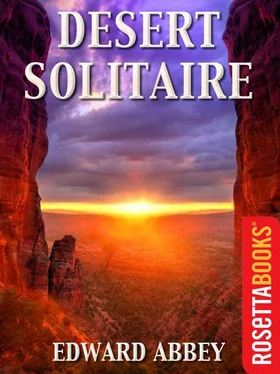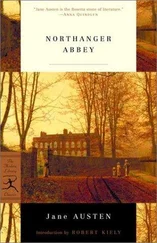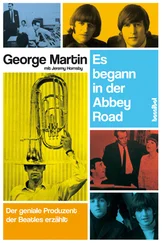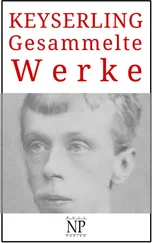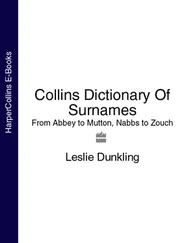Abbey, Edward - Desert Solitaire (Edward Abbey Series )
Здесь есть возможность читать онлайн «Abbey, Edward - Desert Solitaire (Edward Abbey Series )» — ознакомительный отрывок электронной книги совершенно бесплатно, а после прочтения отрывка купить полную версию. В некоторых случаях можно слушать аудио, скачать через торрент в формате fb2 и присутствует краткое содержание. Год выпуска: 2011, Издательство: RosettaBooks, Жанр: Старинная литература, на английском языке. Описание произведения, (предисловие) а так же отзывы посетителей доступны на портале библиотеки ЛибКат.
- Название:Desert Solitaire (Edward Abbey Series )
- Автор:
- Издательство:RosettaBooks
- Жанр:
- Год:2011
- ISBN:нет данных
- Рейтинг книги:4 / 5. Голосов: 1
-
Избранное:Добавить в избранное
- Отзывы:
-
Ваша оценка:
- 80
- 1
- 2
- 3
- 4
- 5
Desert Solitaire (Edward Abbey Series ): краткое содержание, описание и аннотация
Предлагаем к чтению аннотацию, описание, краткое содержание или предисловие (зависит от того, что написал сам автор книги «Desert Solitaire (Edward Abbey Series )»). Если вы не нашли необходимую информацию о книге — напишите в комментариях, мы постараемся отыскать её.
Desert Solitaire (Edward Abbey Series ) — читать онлайн ознакомительный отрывок
Ниже представлен текст книги, разбитый по страницам. Система сохранения места последней прочитанной страницы, позволяет с удобством читать онлайн бесплатно книгу «Desert Solitaire (Edward Abbey Series )», без необходимости каждый раз заново искать на чём Вы остановились. Поставьте закладку, и сможете в любой момент перейти на страницу, на которой закончили чтение.
Интервал:
Закладка:
The quiet forest. There are few birds in the high woods, less wildlife it seems than down below in the sunbaked desert. Probably because at this altitude the summer is so brief—“much too beautiful to last”—and the winter long.
One bird, however, is singing, if you could call it singing. The song is so laconic and melancholic that it very nearly takes all the joy out of my smoke. I don’t know what kind of bird it is, if it is a bird, but the song goes like this, repeated over and over, lentissimo :

When I’ve had enough of this sentiment (there is a bird called the Townsend Solitaire) I get up and walk away, out to the dirt road beyond the old rail fence and up the road to a wide meadow from which I can watch the sun go down over the western world. Mesa, canyon and plateau, the pacific desert lies in whiskey-colored light and lilac dusk, a sea of silence. Clouds edged with fire sail on the clear horizon.
Somebody’s goddamned cows, Scobie’s perhaps or McKee’s, I can’t see the brand, gape at me from the lower side of the meadow. I wave my arm and stick at them and they bolt suddenly for the trees, like deer. I walk among thistles and coarse dying goldenrod (signs of overgrazing) and a kind of sunflower called Five-Nerve Helianthella, knock a few heads off—helping to spread the seed—and ponder the meaning of my solitude. Reaching no conclusions.
Tomorrow morning, Deo volente , I plan a walk to the summit of the pass between Tukuhnikivats and Mount Tomaski. There is a little lake not far over the saddle, a tarn really, a mountain pond bordered in marsh marigold and yarrow, with water black and glassy as obsidian. Bottomless? Certainly. There are some old friends living there whom I haven’t seen for a long time.
Afterwards… back to Moab. Back to the juniper, the red sand, and the fanatic rocks. Into September, the final month.
EPISODES AND VISIONS
Ranger, where is Arches National Monument?
I don’t know, mister. But I can tell you where it was.
Labor Day. Flux and influx, the final visitation of the season, they come in herds, like buffalo, down from The City. A veil of dust floats above the sneaky snaky old road from here to the highway, drifting gently downwind to settle upon the blades of the yucca, the mustard-yellow rabbitbrush, the petals of the asters and autumn sunflowers, the umbrella-shaped clumps of blooming wild buckwheat.
What can I tell them? Sealed in their metallic shells like molluscs on wheels, how can I pry the people free? The auto as tin can, the park ranger as opener. Look here, I want to say, for godsake folks get out of them there machines, take off those fucking sunglasses and unpeel both eyeballs, look around; throw away those goddamned idiotic cameras! For chrissake folks what is this life if full of care we have no time to stand and stare? eh? Take off your shoes for a while, unzip your fly, piss hearty, dig your toes in the hot sand, feel that raw and rugged earth, split a couple of big toenails, draw blood! Why not? Jesus Christ, lady, roll that window down! You can’t see the desert if you can’t smell it. Dusty? Of course it’s dusty—this is Utah! But it’s good dust, good red Utahn dust, rich in iron, rich in irony. Turn that motor off. Get out of that piece of iron and stretch your varicose veins, take off your brassiere and get some hot sun on your old wrinkled dugs! You sir, squinting at the map with your radiator boiling over and your fuel pump vapor-locked, crawl out of that shiny hunk of GM junk and take a walk—yes, leave the old lady and those squawling brats behind for a while, turn your back on them and take a long quiet walk straight into the canyons, get lost for a while, come back when you damn well feel like it, it’ll do you and her and them a world of good. Give the kids a break too, let them out of the car, let them go scrambling over the rocks hunting for rattlesnakes and scorpions and anthills—yes sir, let them out, turn them loose; how dare you imprison little children in your goddamned upholstered horseless hearse? Yes sir, yes madam, I entreat you, get out of those motorized wheelchairs, get off your foam rubber backsides, stand up straight like men! like women! like human beings! and walk— walk —WALK upon our sweet and blessed land!
“Where’s the Coke machine?”
“Sorry lady, we have no Coke machine out here. Would you like a drink of water?” (She’s not sure.)
“Say ranger, that’s a godawful road you got in here, when the hell they going to pave it?” (They gather round, listening.)
“The day before I leave.” (I say it with a smile; they laugh.)
“Well how the hell do we get out of here?”
“You just got here, sir.”
“I know but how do we get out?”
“Same way you came in. It’s a dead-end road.”
“So we see the same scenery twice?”
“It looks better going out.”
“Oh ranger, do you live in that little housetrailer down there?”
“Yes madam, part of the time. Mostly I live out of it.”
“Are you married?”
“Not seriously.”
“You must get awfully lonesome way out here.”
“No, I have good company.”
“Your wife?”
“No, myself.” (They laugh; they all think I’m kidding.)
“Well what do you do for amusement?”
“Talk with the tourists.” (General laughter.)
“Don’t you even have a TV?”
“TV? Listen lady… if I saw a TV out here I’d get out my cannon and shoot it like I would a mad dog, right in the eye.”
“Goodness! Why do you say that?”
“What’s the principle of the TV, madam?”
“Goodness, I don’t know.”
“The vacuum tube, madam. And do you know what happens if you stick your head in a vacuum tube?”
“If you stick your head…?”
“I’ll tell you: you get your brains sucked out .” (Laughter!)
“Hey ole buddy, how far from here to Lubbock?”
“Where’s Lubbock, sir?”
“Texas, ole buddy. Lubbock, Texas.”
“Well sir, I don’t know exactly how far that is but I’d guess it’s not nearly far enough.”
“Any dangerous animals out here, ranger?”
“Just tourists.” (Laughter; tell the truth, they never believe you.)
“Where you keep these here Arches anyway?”
“What arches? All I see around here are fallen arches.”
“Does it ever rain in this country, ranger?”
“I don’t know, madam, I’ve only been here eleven years.”
“Well you said yesterday it wasn’t going to rain and it did rain.”
“Did I? Well, that shows you can’t ever trust the weather.”
“You work out here all year round?”
“No sir, just for the summer.”
“What do you do in the winter?”
“I rest.”
“How much do you get paid for this kind of work?”
“Too much. But I give part of it back April 15th.”
And then, after a brief and deadly dull lecture on the geology of the Arches, I send them on to the campgrounds and picnic grounds—“Be sure to let me know if you get lost”—relieved, happy and laughing. It’s a great country: you can say whatever you like so long as it is strictly true—nobody will ever take you seriously.
In the evening, about suppertime, feeling somewhat guilty and contrite—for they are, most of them, really good people and not actually as simple-minded as they pretend to encourage me to pretend us all to be—I visit them again around the fires and picnic tables, help them eat their pickles and drink their beer, and make perhaps a trace of contact by revealing that I, too, like most of them, come from that lost village back in the hills, am also exiled, a displaced person, an internal emigrant in this new America of concrete and iron which none of us can quite understand or accept or wholly love. I may also, if I am lucky, find one or two or three with whom I can share a little more—those rumors from the underground where whatever hope we still have must be found.
Читать дальшеИнтервал:
Закладка:
Похожие книги на «Desert Solitaire (Edward Abbey Series )»
Представляем Вашему вниманию похожие книги на «Desert Solitaire (Edward Abbey Series )» списком для выбора. Мы отобрали схожую по названию и смыслу литературу в надежде предоставить читателям больше вариантов отыскать новые, интересные, ещё непрочитанные произведения.
Обсуждение, отзывы о книге «Desert Solitaire (Edward Abbey Series )» и просто собственные мнения читателей. Оставьте ваши комментарии, напишите, что Вы думаете о произведении, его смысле или главных героях. Укажите что конкретно понравилось, а что нет, и почему Вы так считаете.
